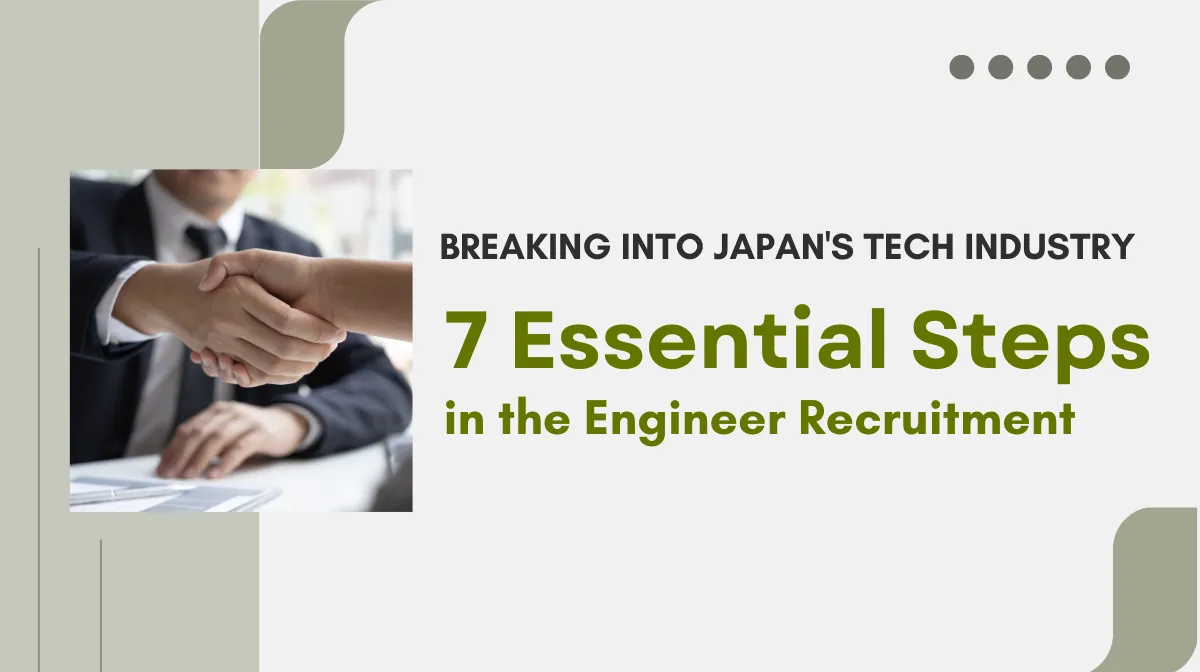In Japan’s IT industry, the recruitment of foreign engineers has been increasing year by year.
However, due to Japan’s unique hiring processes and cultural differences, even engineers with excellent technical skills often struggle to get hired.
This article explains the concrete steps and key points for foreign engineers to secure job offers from Japanese companies from a practical perspective.
- The seven steps to get hired in Japan as a foreign engineer.
- Essential Japanese business etiquette for interviews.
- How to showcase technical skills that Japanese companies value.
1. Japan’s Engineering Job Market and Demand for Foreign Talent

In recent years, recruitment of foreign engineers in Japan’s IT industry has become increasingly active.
This is due to the rapid advancement of technology and globalization, which has increased the demand for talent with diverse technical backgrounds.
Japanese companies’ hiring processes are also evolving from traditional Japan-specific methods to approaches closer to global standards.
The Type of Foreign Engineers Japanese IT Companies Are Looking For
Japan’s IT industry is currently facing a serious talent shortage.
According to a survey by the Ministry of Economy, Trade and Industry, it is predicted that by 2030, there will be a shortage of up to 790,000 IT professionals. To address this challenge, many companies are taking a proactive approach to hiring foreign engineers.
■ Candidates many Japanese companies are seeking and welcoming:
- Those who have specialized technical skills while being adaptable to new technologies
- Those capable of communicating in basic business Japanese
- Those who have the cooperative mindset to adapt to teamwork
- Those motivated to build long-term careers in Japan
Benefits and Growth Opportunities of Working in Japanese Companies
Working as an engineer in a Japanese company offers unique value. First, employment stability is high, and well-established welfare benefit systems are in place.
Many companies also provide systematic technical training and continuous learning opportunities, allowing you to improve your technical skills while experiencing the latest technologies.
Learning Japan-specific quality control and development methodologies can also be a significant advantage in building a global career. Many Japanese companies have a culture that supports the growth of engineers, making long-term skill development possible.
2. Seven Critical Steps to Secure a Job Offer

To successfully secure employment at a Japanese company, a planned approach is necessary. Below, we explain in detail the important steps to secure a job offer.
By carefully progressing through each step, you can effectively advance through the hiring process.
Step 1: Prepare Proof of Japanese Language Skills and Technical Abilities
In the Japanese hiring process, demonstrating language and technical skills is the most important preparation.
■ Regarding Japanese language ability
It is recommended to aim for JLPT (Japanese Language Proficiency Test) N3 or higher. This serves as proof of Japanese language skills necessary for basic business communication.
■ On the technical side
Preparing a portfolio that systematically compiles practical experience and project achievements is essential.
Projects on your GitHub account should be properly documented, making your technical skills visible.
We also recommend creating a list of companies where communication in English is possible and prioritizing your preparation accordingly.
Reference: JLPT (Japanese Language Proficiency Test), GitHub
Step 2: Create Your Resume and Portfolio
Creating a resume is a particularly important preparation stage in the Japanese hiring process.
■ Effective points for creating a Japanese-style resume
- Photos with a suit and white background are common
- Include clear motivation for applying and explain your technical skills in detail
- Organize work history chronologically and quantify specific achievements from each experience
- Preparing both Japanese and English versions will allow you to respond to more opportunities
Your portfolio should include actual project experiences and technical deliverables to concretely demonstrate your technical abilities
Step 3: Research Companies and Submit Application Documents
The selection and research of target companies greatly influences the success of the hiring process. It’s important to investigate each company’s technology stack and project details thoroughly and confirm compatibility with your own skills and experience.
Sufficient research is also needed on the presence of foreign engineers, the company’s growth potential, and future prospects.
Welfare benefit systems are particularly noteworthy, and we recommend checking whether support systems for foreign talent are in place.
When submitting application documents, it’s necessary to accurately follow each company’s required format and pay attention to avoid any omissions.
Step 4: Preparing for Initial Interviews (Online Meetings)
Online interviews have become an important standard step in the hiring process for Japanese companies.
Key points for online interviews
- Ensure a stable internet connection
- Pay attention to appropriate lighting and background settings to create a professional impression
- Maintaining a consistent attitude from self-introduction to Q&A will lead to positive evaluation
It is recommended to practice not only preparing for technical questions but also clearly explaining your motivation for applying in Japanese. In Japanese interviews, understanding and practicing basic business manners is required.
Step 5: Prepare for Technical Interviews and Coding Tests
In technical interviews, practical programming skills and knowledge of system design are tested.
- Understanding of algorithms and data structures
This is an element emphasized by many companies. In interviews, you need to be able to explain the implementation methods and usage scenarios of basic algorithms such as sorting, searching, and tree structures.
- Questions about system design
It’s important to be able to explain design methods that consider scalability and performance, using concrete examples.
- Coding tests
It is recommended to refine your efficient code creation skills through practice on platforms such as HackerRank and AtCoder.
Step 6: Cultural Fit Appeal in Final Interviews
The final interview is an important opportunity to evaluate cultural fit in addition to confirming technical skills.
You are expected to demonstrate understanding of and willingness to adapt to Japanese corporate culture. It is effective to acknowledge the importance of teamwork and share lessons learned from past collaborative experiences.
It’s also important to present a long-term career vision and specifically explain how you can contribute to the company’s growth.
Regarding communication skills, demonstrating flexibility to handle not only technical discussions but also everyday workplace interactions will lead to positive evaluation.
Step 7: Job Offer Negotiation and Various Procedures
After receiving a job offer, it’s important to promptly proceed with the necessary procedures. Check these carefully for a smooth start of employment.
- Confirm the deadline for submitting the letter of acceptance and respond appropriately by the due date
- For residence status change applications, prepare all necessary documents without omission while receiving support from the company. Early action is recommended as it takes a certain period from work visa application to acquisition.
- Check the company’s support system for housing search and establish your living foundation before starting work.
- Confirm the schedule for pre-employment training and plan necessary preparations systematically.
■日本でエンジニアとしてキャリアアップしたい方へ
海外エンジニア転職支援サービス『 Bloomtech Career 』にご相談ください。「英語OK」「ビザサポートあり」「高年収企業」など、外国人エンジニア向けの求人を多数掲載。専任のキャリアアドバイザーが、あなたのスキル・希望に合った最適な日本企業をご紹介します。
▼簡単・無料!30秒で登録完了!まずはお気軽にご連絡ください!
Bloomtech Careerに無料相談してみる
3. Key Points to Consider at Each Step

There are points that require special attention at each stage to lead the hiring process to success. Being aware of these points will enable a more effective job hunting process.
Below, we explain in detail particularly important elements.
How to Showcase Technical Skills Valued by Japanese Companies
How you present your technical skills is very important in the Japanese hiring process.
You are expected to specifically explain practical project experiences and clearly show what kind of problem-solving you performed. Particularly noteworthy is your awareness of code quality and maintainability.
Japanese companies highly value cooperativeness in team development and documentation abilities.
Showing eagerness to learn new technologies is also important; it is desirable to be able to explain your self-development efforts and interest in technology trends with specific episodes.
Common Business Japanese Expressions and Interview Responses
Using appropriate business Japanese is important in interviews with Japanese companies.
Key points for using business Japanese
Starting with basic greeting expressions, proper use of polite expressions such as “Yoroshiku onegaishimasu” (Please treat me favorably) and “Mōshiwake gozaimasen” (I am sorry) is required.
When explaining technical content, you can demonstrate high communication ability by accurately using Japanese technical terms.
Understanding the basic distinction between humble language and honorific language and using them appropriately in the right context is also an important element that demonstrates professionalism.
In responding to questions, using circumlocutory expressions such as “~to kangaete orimasu” (I think that…) can give a more polite impression.
How to Demonstrate Teamwork and Cooperativeness
Many Japanese companies value not only individual technical skills but also aptitude as a team member.
In interviews, it’s important to specifically explain past team collaboration experiences and show how you worked with other members to solve problems.
It’s desirable to be able to explain your methods for dealing with cultural differences based on actual experience.
Also, by explaining collaborative approaches to problem-solving with specific examples, you can make more persuasive appeals.
By demonstrating examples of contributions toward team goal achievement, you can effectively communicate your high adaptability to organizations.
4. Cultural Differences in the Hiring Process and Coping Strategies

The hiring process at Japanese companies contains many unique cultural elements. Understanding these and responding appropriately is a key to successful hiring.
Below, we explain in detail the major cultural differences and how to address them.
Essentials of Japanese Business Etiquette
Basic manners in Japanese business culture are important elements throughout the hiring process.
- How to bow and greet
These are the most basic and important business manners, so check them well in advance. - Business card exchange
Receive the other person’s business card carefully with both hands and be sure to check it on the spot. - Seating arrangements in interviews
There are Japan-specific rules, and it’s desirable to understand the concepts of kamiza (higher seat) and shimoza (lower seat). - Regarding attire
Strive for a clean appearance, and particularly for interviews, it is recommended to wear navy blue or black suits. - Punctuality
This is a particularly valued element in Japanese business culture, so arrive with time to spare for interview appointments and other scheduled meetings.
Implicit Understanding vs. Explicit Communication
Understanding the communication style unique to Japanese companies is essential for smooth progression through the hiring process.
The concept of “Ho-Ren-So” (Report-Contact-Consult) is fundamental to Japanese business communication. It demonstrates the importance of sharing work progress and issues at appropriate times.
Learning to interpret ambiguous expressions unique to Japanese is necessary. For example, a response like “We will consider it” is not necessarily an affirmative answer. It needs to be interpreted appropriately according to the context and situation.
The importance of non-verbal communication cannot be overlooked. Facial expressions, gestures, and the way pauses are taken also constitute important parts of the message.
Furthermore, collective decision-making processes are common in Japanese companies, and understanding and adaptation to such organizational cultures are also required.
How to Demonstrate Long-term Career Orientation
In Japanese companies, career development from a long-term perspective is valued. In interviews, it’s important to show not just technical skills or value as an immediate asset but also a future growth vision within the organization.
Specifically, it’s effective to clearly explain your long-term growth plan at a Japanese company and present a concrete plan for improving technical skills.
Also, by showing your vision for contributing to the company’s growth, you can express shared values with the organization.
Showing willingness to adapt to Japanese culture is also important; it is recommended to appeal your commitment to learning Japanese and your attitude toward deepening understanding of Japanese corporate culture.
■日本でエンジニアとしてキャリアアップしたい方へ
海外エンジニア転職支援サービス『 Bloomtech Career 』にご相談ください。「英語OK」「ビザサポートあり」「高年収企業」など、外国人エンジニア向けの求人を多数掲載。専任のキャリアアドバイザーが、あなたのスキル・希望に合った最適な日本企業をご紹介します。
▼簡単・無料!30秒で登録完了!まずはお気軽にご連絡ください!
Bloomtech Careerに無料相談してみる
5. Practical Preparations and Procedures After Receiving a Job Offer

After securing a job offer, practical preparations and various procedures become an important stage. It is required to effectively utilize this period to lead to smooth business operations after joining the company.
Below, we explain the main preparation items.
Specific Steps for Work Visa Application
The work visa application process is an important step to start working in Japan. The general application procedure takes about 2-3 weeks and requires careful preparation.
Create an application for change of status of residence together with the company’s representative
For this, documents such as copies of your passport and residence card, certificate of final academic background (with translation), resume (with translation), and a copy of the job offer notice are required. The company must submit documents such as financial statements and corporate registration certificates.
■ Regarding the application
- Starting with the company obtaining a Certificate of Eligibility for Status of Residence, the collection and translation of necessary documents proceed in parallel
- The application to the Immigration Bureau is usually supported by the company, and after an examination period of about two weeks, you can obtain your status of residence
- Many Japanese companies partner with administrative scriveners, making it possible to proceed with these procedures with the support of experts
Preparation of Documents Required Before Starting Work
Document preparation for starting work needs to be planned systematically. Careful preparation is required for smooth onboarding procedures.
- Academic certificates
In addition to the original issued by educational institutions in your home country, you need to prepare a Japanese translation. Having the translation certified by a notary public will make it a more reliable document. - Employment certificates
Similar to academic certificates, you need to obtain certificates from previous employers and attach appropriate translations. - Health examination certificate
It is common to require diagnostic results based on examination items specified by the Japanese company.
Documents related to resident registration should be processed promptly once your address in Japan is determined. Documents necessary for opening a bank account should also be prepared in preparation for salary payment after joining the company.
Tips for Finding Housing and Setting Up Life
Establishing a living foundation in Japan is an important element for a smooth start of employment.
- Finding housing
Regarding housing search, selecting a reliable real estate company is important. Choosing a real estate company that can accommodate foreigners will minimize language barriers. In many cases, a guarantor or guarantor company is required for rental contracts, but some companies provide housing allowances or guarantor systems, so it is recommended to check in advance. - How to contract utilities
You need to plan procedures for necessary utilities such as electricity, gas, water, and internet. - Preparation of daily necessities
Equip yourself with necessary items such as furniture and appliances, considering budget and priorities. - Participation in the local community
Participation in the local community is effective for a more fulfilling life in Japan. By participating in neighborhood associations and local events, communication with neighbors will make adaptation to the living environment smoother.
6. Learning from Successful Hiring Cases

By analyzing successful hiring cases at Japanese companies, important hints for effective job hunting can be obtained.
Below, we share practical insights from successful cases of engineers with various backgrounds.
Success Stories of Transitions from GAFAM
Important lessons can be learned from cases of successful transitions from global major IT companies to Japanese companies.
Common among these successful individuals is first, their proactive approach to learning Japanese. They gradually acquired the Japanese language skills necessary for work while deepening their understanding of Japanese corporate culture.
In clearly presenting their technical skills, they showed past project achievements with quantitative results and specifically explained how they could contribute to the business areas of Japanese companies.
As for cultural understanding efforts, they had conducted sufficient research and demonstrated understanding of Japan-specific quality control methods and team collaboration styles in advance.
In sharing long-term visions, they clearly showed the alignment between their career plans and the company’s growth strategy, effectively appealing their fit with the corporate culture by presenting possibilities for mutual value creation.
Hiring Cases at Startup Companies
Success stories in hiring at startup companies demonstrate more flexible and innovative approaches. What is characteristic of these cases is the ability to adapt to flat organizational structures.
In startup-specific environments, role boundaries are flexible, and you need to respond to various tasks.
Successful individuals viewed this environment as an opportunity for active learning and growth, deepening their understanding not only of technical skills but also of business aspects.
By demonstrating flexible responsiveness to diverse roles, they proved their potential for success in rapidly growing environments.
Showing an innovative attitude is also important; active proposals and implementation experiences with new technologies and approaches are highly valued.
Having both situational judgment and execution ability in environments that require speedy decision-making has been a factor in hiring success.
Examples of Questions That Made Good Impressions in Interviews
Questions that made good impressions in hiring interviews are important elements that show the applicant’s deep understanding and enthusiasm.
Through questions, demonstrating an attitude of deepening understanding of not just technical skills but also the company’s values and culture leads to successful hiring.
Questions about technology stack development plans
While showing interest in the company’s future technical strategy, the attitude of confirming alignment with their own skill improvement plans was valued.
Questions about team development approaches
It was effective to express interest in teamwork while demonstrating understanding of specific development methods such as agile development and scrum.
Questions about training and development programs
These provide a good opportunity to show enthusiasm for long-term career development.
Questions about remote work policies and possibilities of global expansion are especially valued as showing interest in work flexibility and business growth potential.
7. Understanding Japan’s Foreign Engineer Hiring Process and Ensuring Thorough Preparation
Getting a job at a Japanese company requires not only technical skills but also cultural understanding and preparation.
By steadily advancing through the seven steps introduced in this article and grasping the important points at each stage, the path to successful hiring will open.
There will surely be opportunities to utilize your experience and skills in Japan’s IT industry, which is seeking global talent. Let’s take the first step.

















